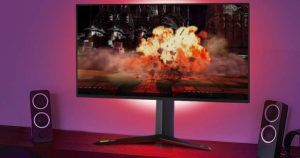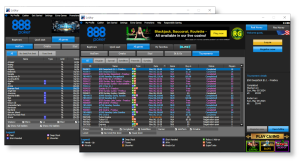Four wealthy hedge fund managers sold shares of Nvidia during the fourth quarter and redeployed capital into a supercharged Nasdaq-100 index fund.
Nvidia has been an ideal long-term investment. Shares soared 45,900% over the last 20 years as the company transitioned from computer graphics trailblazer to accelerated computing powerhouse. But the stock has been especially hot lately. Shares more than tripled during the past 12 months as investors leaned into the artificial intelligence gold rush. But those gains have given rise to concerns about Nvidia’s valuation.
Specifically, while certain Wall Street analysts still see upside, some expect shares to decline over the next year. The four hedge fund billionaires listed below navigated that situation by selling some Nvidia stock in the fourth quarter, while simultaneously purchasing shares of the Invesco QQQ Trust (QQQ 1.54%), an index fund that tracks the Nasdaq-100.
- John Overdeck and David Siegel of Two Sigma Investments sold 30,663 shares of Nvidia in the fourth quarter, reducing their stake by 5%. Meanwhile, they increased their position in the Invesco QQQ Trust by 75%, such that the index fund is now the second-largest position in their portfolio.
- Israel Englander of Millennium Management sold 1.7 million shares of Nvidia during the fourth quarter, reducing his stake by 45%. Meanwhile, he increased his position in the Invesco QQQ Trust by 53%, though it remains a relatively small holding.
- Ron Baron of Bamco sold 59,942 shares of Nvidia in the fourth quarter, reducing his stake by 10%. He also started a small position in the Invesco QQQ Trust.
What makes those trades interesting is that Nvidia is the third-largest position in the Invesco QQQ Trust. In other words, the four fund managers listed above exchanged a portion of their direct ownership in Nvidia for a more diluted form of ownership, which also provides exposure to other technology stocks.
In any case, the Invesco QQQ Trust returned 1,260% over the last two decades, more than doubling the performance of the S&P 500 (^GSPC 1.02%). Here’s what investors should know about that supercharged index fund.
The Invesco QQQ Trust offers exposure to technology stocks that should benefit from artificial intelligence
The Invesco QQQ Trust measures the performance of the Nasdaq-100, an index that tracks the 100 largest companies listed on the Nasdaq Stock Exchange. The Invesco QQQ Trust spreads capital across 10 of the 11 stock market sectors — the financial sector is the lone exclusion — but its composition is most heavily weighted toward the information technology (58.9%) and consumer discretionary (17.9%) sectors.
The 10 largest holdings in the Invesco QQQ Trust are listed by weight below.
- Microsoft: 8.7%
- Apple: 7.7%
- Nvidia: 6.1%
- Alphabet: 5.3%
- Amazon: 5.3%
- Broadcom: 4.5%
- Meta Platforms: 4.5%
- Costco Wholesale: 2.4%
- Tesla: 2.4%
- Advanced Micro Devices: 1.9%
While many investors consider Nvidia the quintessential artificial intelligence (AI) stock, almost every company listed above is well positioned to monetize AI.
For instance, Microsoft, Alphabet, and Amazon are the three largest cloud computing companies in the world, meaning they are gatekeepers of AI infrastructure and platform services. Broadcom is the leader in application specific integrated circuits (ASICs), meaning it helps companies like Meta Platforms and Alphabet design custom AI chips.
Similarly, Tesla is designing full self-driving software and its supercomputer (Dojo) is purpose-built for training computer vision systems; both represent potentially significant revenue streams. Finally, Advanced Micro Devices is the second largest supplier of data center GPUs, though it trails Nvidia’s market share by about 90 percentage points.
In short, while the Invesco QQQ Trust is not explicitly an AI index fund, it offers convenient exposure to many companies that should benefit as businesses spend more money on AI.
The Invesco QQQ Trust delivered stunning returns during the last two decades
The Invesco QQQ Trust has been an excellent, though volatile, long-term investment. The index fund returned 1,260% over the last 20 years, compounding at 13.9% annually. By comparison, the S&P 500 returned 563% during the same period, compounding at 9.9% annually. In other words, $10,000 invested in the Invesco QQQ Trust in April 2004 would be worth $136,000 today, but the same amount invested in an S&P 500 index fund would now be worth $66,300.
However, that tremendous outperformance has come at price. The Invesco QQQ Trust bears a 10-year beta of 1.12, meaning it moved 112 basis points (1.12 percentage points) for every 100-basis-point movement in the S&P 500. In other words, the Invesco QQQ Trust has been a very volatile investment. That quality cuts both ways. Volatility is helpful when the stock market is moving higher, but hurtful when the stock market is moving lower. As a result, the Invesco QQQ Trust tends to underperform during market downturns.
The last item of note is the expense ratio. The Invesco QQQ Trust bears an expense ratio of 0.2%, meaning investors will pay $2 per year on every $1,000 invested in the fund.
Here is the bottom line: The Invesco QQQ Trust is heavily weighted toward the technology sector. As such, the index fund benefited greatly from disruptive innovations like mobile devices and cloud computing during the last two decades, and it should benefit greatly as AI spending explodes in the coming years. In that sense, the Invesco QQQ Trust is a great option for patient, risk-tolerant investors hoping to capitalize on the AI boom. But it would be a poor choice for any investor hoping to avoid volatility.
Suzanne Frey, an executive at Alphabet, is a member of The Motley Fool’s board of directors. John Mackey, former CEO of Whole Foods Market, an Amazon subsidiary, is a member of The Motley Fool’s board of directors. Randi Zuckerberg, a former director of market development and spokeswoman for Facebook and sister to Meta Platforms CEO Mark Zuckerberg, is a member of The Motley Fool’s board of directors. Trevor Jennewine has positions in Amazon, Nvidia, and Tesla. The Motley Fool has positions in and recommends Advanced Micro Devices, Alphabet, Amazon, Apple, Costco Wholesale, Meta Platforms, Microsoft, Nvidia, and Tesla. The Motley Fool recommends Broadcom and recommends the following options: long January 2026 $395 calls on Microsoft and short January 2026 $405 calls on Microsoft. The Motley Fool has a disclosure policy.



